Farmers’ ‘Rail Roko’ Protest Causes Chaos: 84 Trains Cancelled
On Day 4 of the ongoing “rail-roko” farmers protests at Shambhu railway station in Punjab’s Patiala district, about 159 trains were delayed and over 84 trains were cancelled. Since the beginning of the protests on April 17, as many as 600 trains running on the Ambala Ludhiana–Amritsar route have been diverted or cancelled.
The farmers have been protesting under the banners of the Samyukta Kisan Morcha (non-political) and Kisan Mazdoor Morcha (KMM) since April 17, demanding the release of three young farmers who were (Anish Khatkar, Navdeep Jalbera, and Gurkirat Singh) arrested by the Punjab police during the “Delhi Chalo” march.
Other key demands, like the inclusion of the Minimum Support Price (MSP) for crops, waving of agriculture debts, doubling of income by 50%, etc., have also been put forth by the protesting farmers.
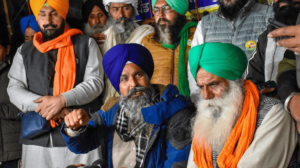
The convener of the Kisan Mazdoor Sangh and leader of the “Delhi Chalo” march, Sarwan Singh Pandher, has said that until the three arrested farmers are released and the centre apologises and pays for its failure to fulfil past promises it had made, the protests will go on.
Surjeet Singh Phool, president of BKU Krantikari, has said, “We have been sitting on the tracks of Shambhu railway station since April 17, and if the three arrested youngsters are not released by Sunday, we will start yet another indefinite dharna at Khatkar toll plaza in Jind district of Haryana from Monday onwards. We will also conduct a Maha Panchayat in Jind on Monday.
Railway authorities have alleged that until Friday, refunds of Rs 36 lakh were issued to passengers affected by the ongoing protests. An official from the Ambala Railway Division has stated that the online refund data is uncalculated, and upon calculation, the amount may increase even more.
He also added that Rs 13.02 lakh was given to the Ferozepur railway division and Rs 23.22 lakh was allocated to the Ambala railway division.
Why are the ongoing farmer’s protests so significant?
Despite India being an agrarian-centred nation, Indian farmers have received the brunt of the BJP’s hate ever since the first protests began in India at the height of the ruling party’s NRC-CAA campaign.
The corporate-centric agenda of the BJP government has revealed itself over the years through PM Narendra Modi’s close ties with Reliance owner Mukesh Ambani, who is currently the richest person on the planet with over 116 billion dollars. As a matter of fact, currently, 40% of India’s wealth is controlled by 1% of the ultra-rich.
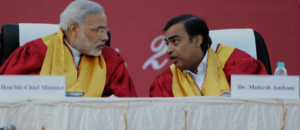
Before the COVID-19 pandemic, Indian farmers from various states had gathered in New Delhi to protest against the government in 2020–21 for a long 13 months. The protestors accused the BJP of spreading false promises and propaganda in a bid to destroy the livelihoods of farmers in the country.
The protests were subsequently ended in December 2021, after the three controversial farm laws were repealed by the government, but not without casualties. As of October 2021, the Bharatiya Kisan Union (BKU) estimates that approximately 750 protestors were killed in clashes with security officials since the beginning of the protests in September 2020.
Following the government’s dictatorial approach to suppressing all forms of dissent, be it on the road or digitally, farmers believe that continuing the protests is the only way to make themselves heard by a government that is deaf to the problems of the very segment of society that makes up the backbone of our nation.
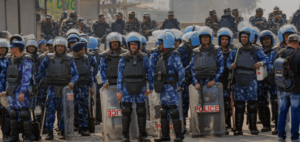
The farmers had previously announced on February 12 that the protestors would march on to New Delhi and restart the 2020–21 protests. But on the day of the “Delhi Chalo” campaign, the centre posted thousands of police and CRPF (Central Railways Protection Force) personnel on the Punjab-Haryana border in a bid to repel the protests.
As a result, violence broke out, tear gas shells were fired, and lathi charges were conducted, halting the march of protestors in their tracks. The farmers have also alleged that many other protestors who were travelling from various different states of India were also stopped from joining the protest.
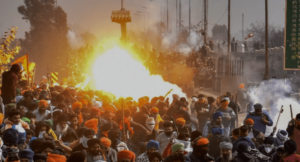
Despite immense opposition from the government, the farmers have continued their protest at Shambhu and Khanauri border points and are not planning to stop any time soon unless their demands are met.
Farmer’s protest : A reminder of India’s agrarian economy
The ongoing protests are a symbol of the shimmering discontentment of Indian farmers against the ruling party of the nation, the BJP. The current demand put forth by the protestors are a living embodiment of their lack of faith in the promises of the union government.
Considering the BJP’s aggressive approach to suppressing any forms of dissent as seen in the past (2020–21 farmer’s protests), the protestors realise the government’s plans to convert India’s agrarian landscape into a corporate one.
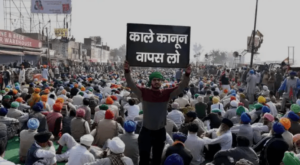
Farmers believe that the establishment of mega corporations as middlemen will further reduce the income of farmers and bring about the destruction of India’s agrarian economy, which supports over 150 million farmers in India.











